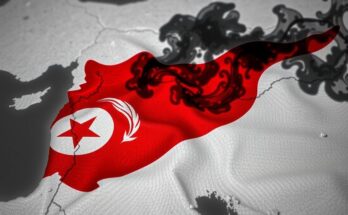Saudi Arabia’s intentions to normalize relations with Israel have significantly diminished following recent violent events, including Hamas’s attacks. The kingdom is now focusing on enhancing ties with Iran while asserting that any diplomatic agreements with Israel are contingent on the acceptance of a Palestinian state. A shift in regional dynamics is becoming evident with recent diplomatic meetings involving Iranian officials and Gulf states, indicating a potential easing of historic tensions.
A significant diplomatic shift is unfolding in the Middle East, particularly in the context of Saudi Arabia’s foreign relations. A year ago, Saudi Arabia seemed poised to normalize relations with Israel, but following Hamas’s attacks on October 7 and the protracted conflict in Gaza, the kingdom’s diplomatic stance has dramatically changed. Current indications suggest that Saudi Arabia is moving towards strengthening ties with Iran, its long-standing rival. Saudi Arabia’s initial openness to diplomatic relations with Israel has diminished considerably. This has occurred even in light of the recent assassination of Yahya Sinwar, the Hamas leader, which some viewed as an opportunity for a peace initiative. However, Saudi officials are now asserting that any agreements must involve Israel’s recognition of a Palestinian state, signaling a notable shift in the kingdom’s priorities. In a surprising turn of events, recent diplomatic meetings among the foreign ministers of the Persian Gulf states and Iran reflect a changing atmosphere in the region. This meeting, a joint discussion with Iran’s foreign minister for the first time in years, marks the beginning of a cautious rapprochement that could gradually address longstanding sectarian conflicts between Riyadh and Tehran. Furthermore, Iranian Foreign Minister Abbas Araghchi’s engagements in the region—culminating in visits to countries like Iraq, Oman, Jordan, Egypt, and Turkey—indicate Iran’s proactive approach in seeking dialogue and reducing tensions. His remarks underscore a shared concern among regional nations about the potential for expanded conflict arising from the situation in Gaza and Lebanon. Overall, this evolving landscape suggests that the anticipated normalization deal with Israel is further from realization than ever, as Saudi Arabia recalibrates its foreign policy to address its relationship with Iran and the Palestinian issue.
The geopolitical climate in the Middle East has been heavily influenced by the longstanding animosity between Saudi Arabia and Iran, which has contributed to regional instability. Historically, Saudi Arabia has been a significant proponent of Palestinian statehood and has often positioned itself in opposition to Iranian influence in the region. The potential normalization of ties with Israel was seen as a strategic move not only against Iran but also as a means to foster peace and stability. However, recent events, including escalating violence and deepening crises in Gaza, have complicated these dynamics, leading Saudi Arabia to reassess its alliances.
In conclusion, the evolving diplomatic scenario in the Middle East signifies a monumental shift away from the anticipated normalization of relations between Saudi Arabia and Israel. The repercussions of the Hamas attacks and the ongoing conflict in Gaza have prompted Saudi Arabia to pivot towards dialogue with Iran, thereby prioritizing regional stability and Palestinian statehood over previous normalization efforts. As the foreign ministers of Gulf states and Iran engage in dialogue, the groundwork for a potential alleviation of long-standing sectarian tensions may emerge, albeit with cautious optimism.
Original Source: www.nytimes.com




